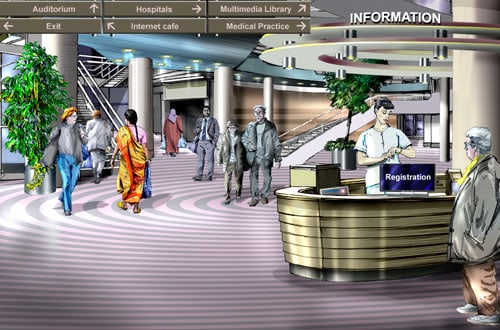
The INMEDEA Simulator to educate HCPs
Interactive games are set to be the new frontier in education for healthcare professionals (HCPs) according to a leading expert in e-learning.
Speaking at the European CME Forum in London last week, Prof Peter Henning of Karlsruhe University in Germany explained that making learning “fun” could reverse a declining trend for the use of e-learning as part of continuing medical education (CME).
“Current mainstream CME e-learning courses are nice, but the number of participants is going down,” said Prof Henning, references such examples as an online eye surgery video/text course at the Virtual University of Bavaria that has just 56 participants.
He added: “Do we stick to such types of courses that have to be paid for, updated regularly and you have to be registered to participate? The answer is, of course, no.”
Instead, the use of ‘serious games’ with learning aspects should be considered as an alternative, said Prof Henning, noting that gaming has long been used as a form of education.
“Playing a game was one of the earliest strategies for learning complex patterns,” he said. “Whenever we play we are learning. So the question has to be: Why did we ever take out the fun out of learning?”
To support his point, Prof Henning provided example projects submitted to the European E-Learning Award eureleA, for which Prof Henning is head of the jury
These included the INMEDEA Simulator, which allows HCPs to example virtual patients in an online clinic, and a programme designed by Line Communications that educates doctors on the classification of bone fractures via a goal-based approach that incorporates time challenges and other gaming elements.
The hardware for gaming could also be beneficial in healthcare education, according to Prof Henning, who noted the potential of the Microsoft Kinect – a piece of kit for the Xbox console that recognises body movements.
This technology is already finding uses in healthcare, with Microsoft teaming up with Tokyo Women’s Medical University to devise a non-touch system to control a video camera during surgery.
Kinect being used to control a video camera during surgery
Gamification has been a buzzword in healthcare for several years, although it is only recently that companies are making use of its potential.
This has so far mainly involved patient education, including Boehringer Ingelheim’s Syrum game for Facebook, which aimed to educate people about the pharma industry, and Sanofi’s Monster Manor to educate children with diabetes.
Gaming has also had applications in research, including a wide crowd-sourcing approach to puzzle solving via Kaggle and Cancer Research’s attempts to find a cure for cancer.




